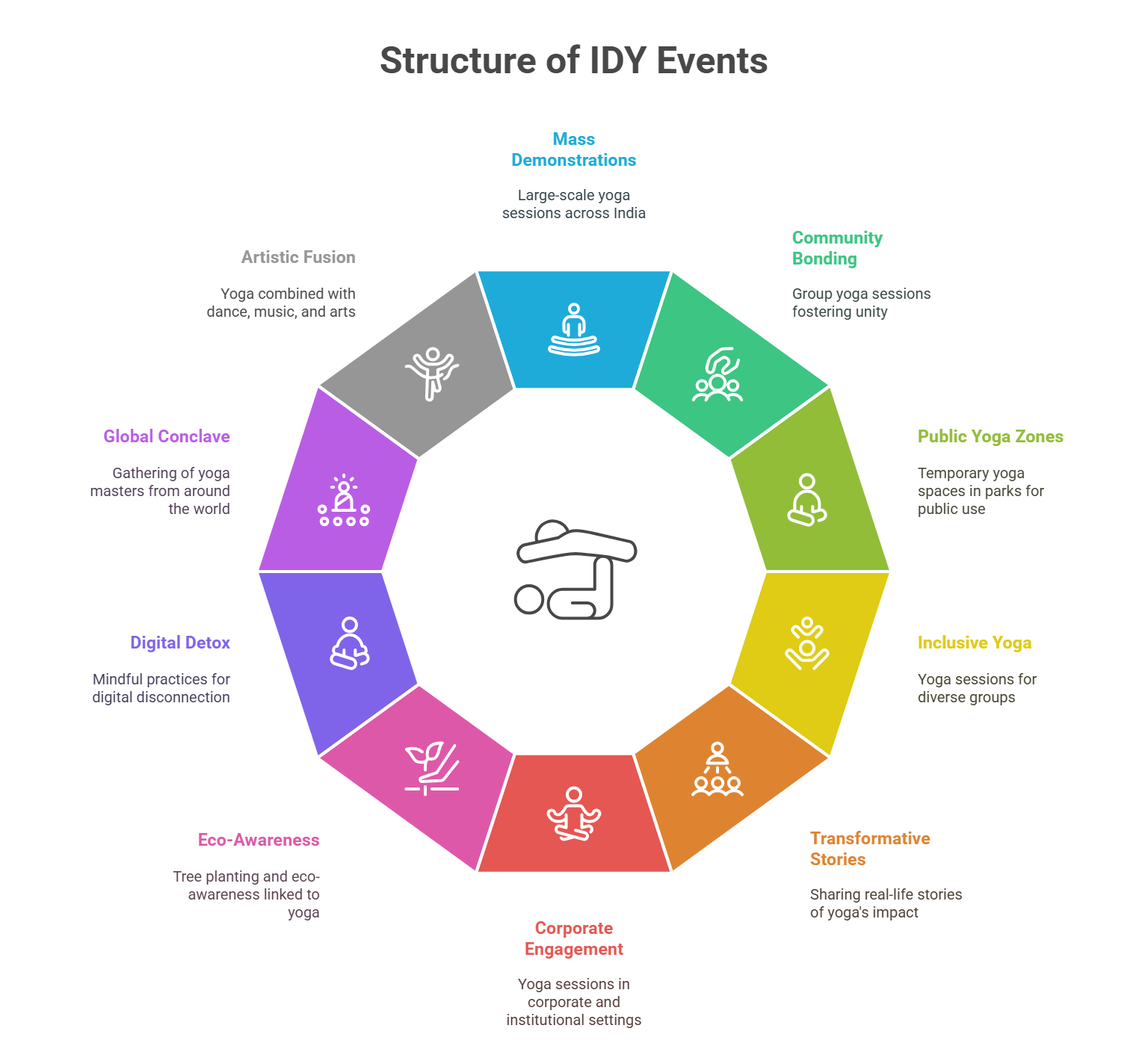India Celebrates 11th International Yoga Day Marking "Yoga for One Earth, One Health"
Published : 21-Jun-2025 02:58:36 PM
India marked the 11th International Day of Yoga (IDY) with unprecedented enthusiasm, as Prime Minister Narendra Modi led the main ceremony in Visakhapatnam, Andhra Pradesh, emphasizing the transformative power of yoga for both individual wellness and planetary well-being. The United Nations designated June 21 as International Yoga Day in 2014, following Prime Minister Modi’s universal appeal to create global awareness about the manifold benefits of practicing yoga.
Prime Minister Narendra Modi, in his address to the UN General Assembly (2014), had described yoga as “an invaluable gift from ancient tradition that unites body and mind, thought and action,” emphasizing its role in discovering “the sense of oneness with oneself, the world, and nature.”
The theme for International Yoga Day 2025 is “Yoga for One Earth, One Health,” which underscores India’s commitment to sharing the ancient wisdom of yoga for holistic health and environmental sustainability. The celebration of International Yoga Day 2025 reaffirms India’s commitment to sharing this ancient practice with the world, promoting not just individual health but also contributing to global well-being and environmental consciousness. As the practice continues to gain worldwide recognition, it serves as a bridge between ancient wisdom and modern wellness needs, offering a holistic approach to health that encompasses physical, mental, and spiritual dimensions.
Contextually, the word “yoga” derives from the Sanskrit root “yuj,” meaning “to join” or “to unite,” symbolizing the union of body, mind, and soul, as described in yogic scriptures. The classical period of yoga development is considered to span from 500 BCE to 800 CE. June 21 was chosen as International Yoga Day due to its spiritual and astronomical significance. This date marks the summer solstice in the Northern Hemisphere, the longest day of the year when Earth tilts highest toward the sun. According to yogic tradition, it was on this day that Adiyogi (the first yogi), also known as Shiva, began imparting the knowledge of yoga to the Saptarishis (seven sages).
As yoga teacher Erich Schiffmann eloquently stated, “Yoga is a way of moving into stillness to experience the truth of who you are.” At the same time, renowned instructor Rodney Yee emphasized that “the most important pieces of equipment you need for doing yoga are your body and your mind.”
In line with 2025, the national ceremony for International Yoga Day, held from 6:30 to 8:00 AM in Visakhapatnam, witnessed an extraordinary gathering of approximately 5 lakh participants under the “Yogandhra” initiative. The event aimed to integrate yoga into daily life while conveying the message of unity and well-being across diverse communities. Yoga demonstrations were organized at nearly 1,00,000 locations nationwide, making this one of the largest synchronized yoga events in history. The Ministry of Ayush orchestrated celebrations through various signature programs, including Yoga Sangam- a mass demonstration of Yoga across India.
In complement to the main celebration, the Ministry of Culture organized yoga sessions at 100 iconic destinations and 50 cultural sites across the country, including prominent UNESCO World Heritage Sites. Participants performed yoga at historically significant locations such as Rani ki Vav and Dholavira in Gujarat, the Sun Temple at Konark in Odisha, Elephanta Caves in Maharashtra, Charaideo Moidam in Assam, the Khajuraho group of monuments, and Sanchi Stupa in Madhya Pradesh. Additional sessions were conducted at cultural landmarks including Jallianwala Bagh in Punjab, Leh Palace in Ladakh, Kumbalgarh Fort in Rajasthan, Hazarduari and Cooch Behar Palaces in West Bengal, and Pari Mahal in Srinagar, Jammu and Kashmir.
The Ministry of Ayush introduced the Yoga Samavesh program, specifically designed to promote yoga among senior citizens, diabetic patients, pregnant women, and individuals recovering from substance abuse. This targeted approach recognizes yoga’s therapeutic potential for vulnerable populations.
Ten signature events marked this year’s celebrations, including Yoga Bandhan, Yoga Park, Yoga Prabhav, Yoga Connect, and Harit Yoga, which uses yoga to propagate environmental conservation messages. Yoga Unplugged was specially designed to encourage young people to incorporate yoga into their daily lives, promoting mindfulness and overall well-being among youth. Yoga Mahakumbh presented yoga in a festive format across 10 different cities, while Samyoga focused on integrating yoga with traditional medical systems, including Ayurveda, Siddha, Unani, Homoeopathy, Naturopathy, and Sowa Rigpa.

According to the “Yoga Statistics: How Many People Do Yoga Worldwide 2024” report, the global yoga industry is projected to reach a value exceeding $200 billion by 2025, compared to approximately $90 billion currently. The report indicates that 72% of global yoga practitioners are women, with the majority of practitioners falling within the 30-39 age group, when individuals typically begin prioritizing health and wellness.
A comprehensive survey conducted by the Ayush Ministry across 34 states and Union Territories, titled “Impact Assessment of a Decade of International Day of Yoga: Survey Findings,” revealed varying levels of yoga adoption among Indians. The study found that 11.2% of respondents practice yoga regularly, 13.4% practice occasionally, while 75.5% do not practice yoga at all.
However, among practitioners, 24.6% reported improved fitness, 16.9% experienced reduced stress levels, and 25% gained valuable health knowledge. Dr. Raghavendra Rao, Director of the Central Council for Research in Yoga and Naturopathy (CCRYN), noted that over 41% of participants have adopted yoga into their lifestyle in various forms, including bhakti yoga (devotional practices), meditation, and self-practice techniques for mental tranquility.
Medical research has extensively documented the therapeutic benefits of Yoga, making it a cornerstone of preventive healthcare. Regular yoga practice enhances cardiovascular health by reducing blood pressure, improving circulation, and strengthening the heart muscle. It significantly reduces stress hormones like cortisol with increased endorphin production, for improved mental health and emotional stability. Yoga’s impact on respiratory health is particularly notable, as breathing exercises (pranayama) increase lung capacity and improve oxygen efficiency. It also enhances flexibility, strengthens core muscles, and improves posture, contributing to better overall physical fitness. Studies indicate that yoga can help manage chronic conditions such as diabetes, arthritis, and chronic pain while boosting immune system function. From a mental health perspective, yoga promotes mindfulness, reduces anxiety & depression, and improves cognitive function. The meditative aspects of yoga practice have been shown to enhance focus, memory, and decision-making abilities while promoting better sleep quality.
Furthermore, the celebrations concluded with participants across the nation pledging to incorporate yoga into their daily routines, supporting the vision of a healthier, more unified world through the practice of this ancient discipline.
Get in Touch
Have An Enquiry? Write To Us…
Related Packages
Information Links and Downloads

We Got Featured in the Media
Stay Connected for All Updates!
For the latest updates on Kailash Mansarovar Yatra, Adi Kailash Yatra
and other incredible travel destinations, make sure you’re following our channel

 WhatsApp
WhatsApp Instagram
Instagram













